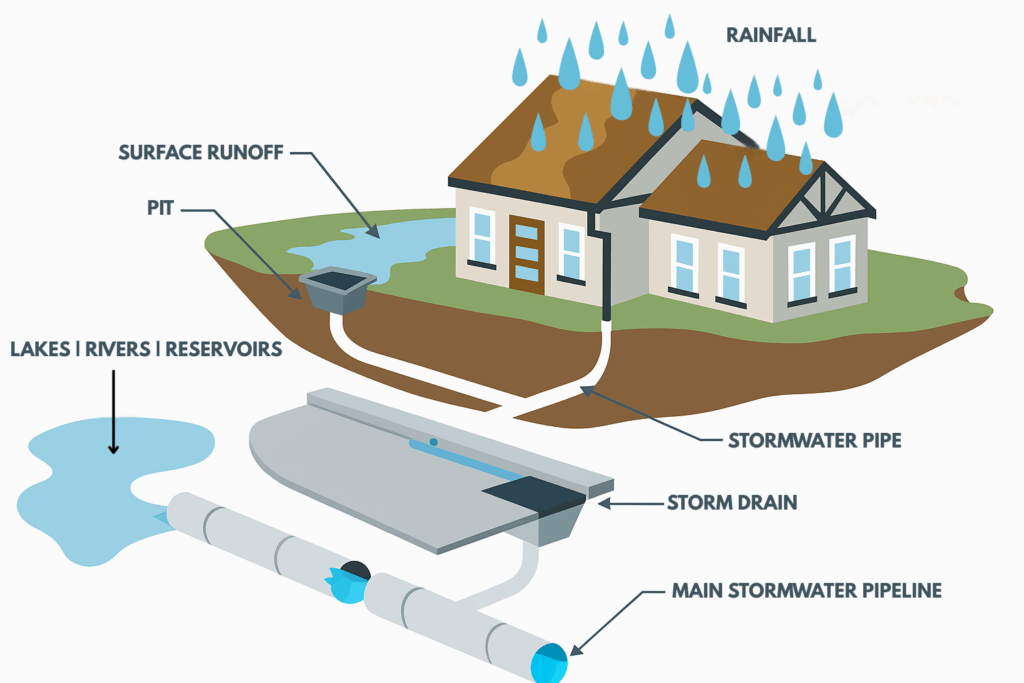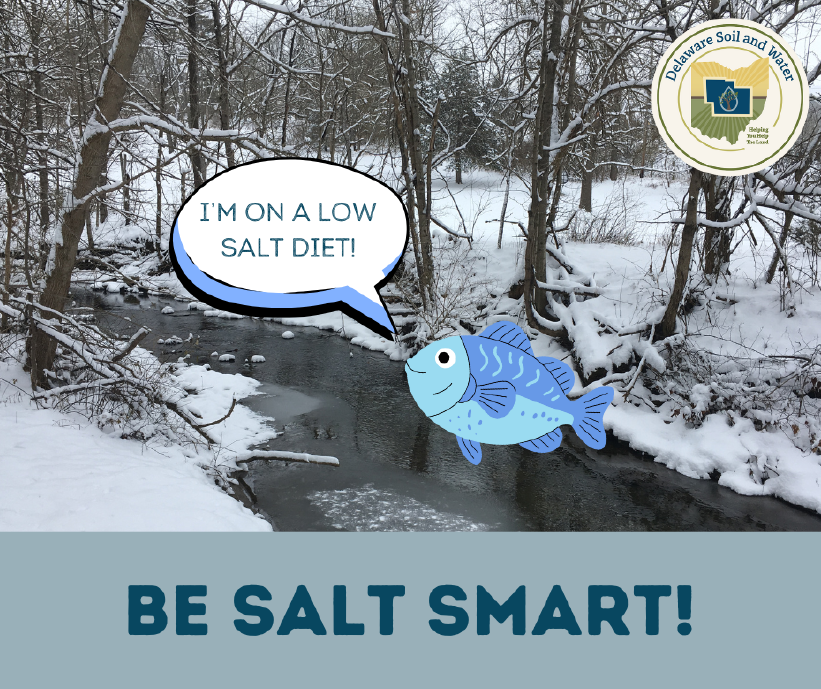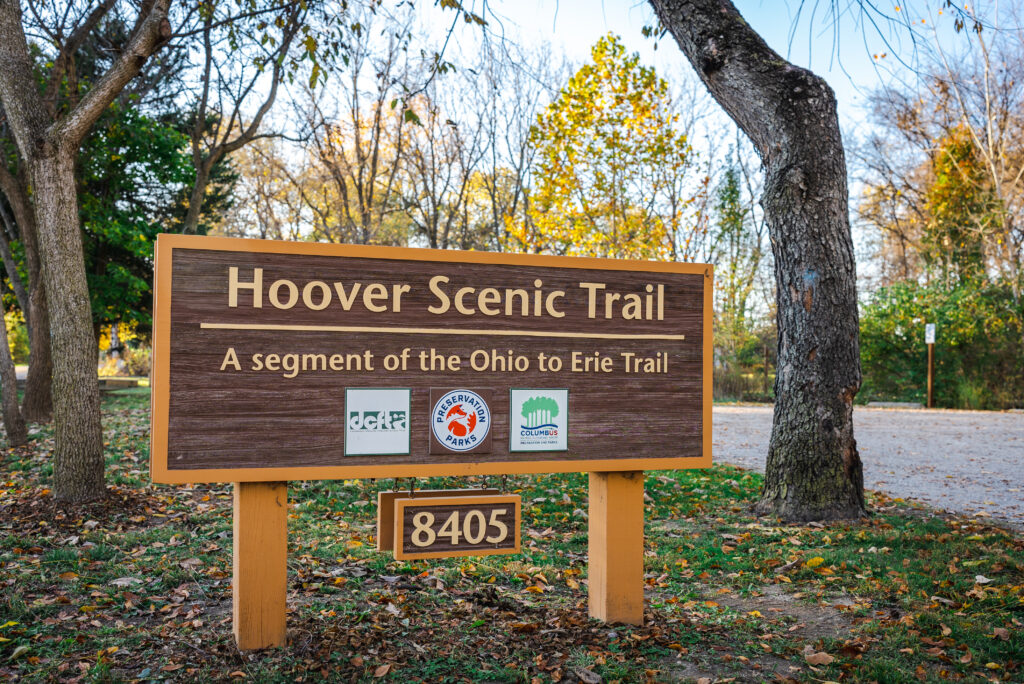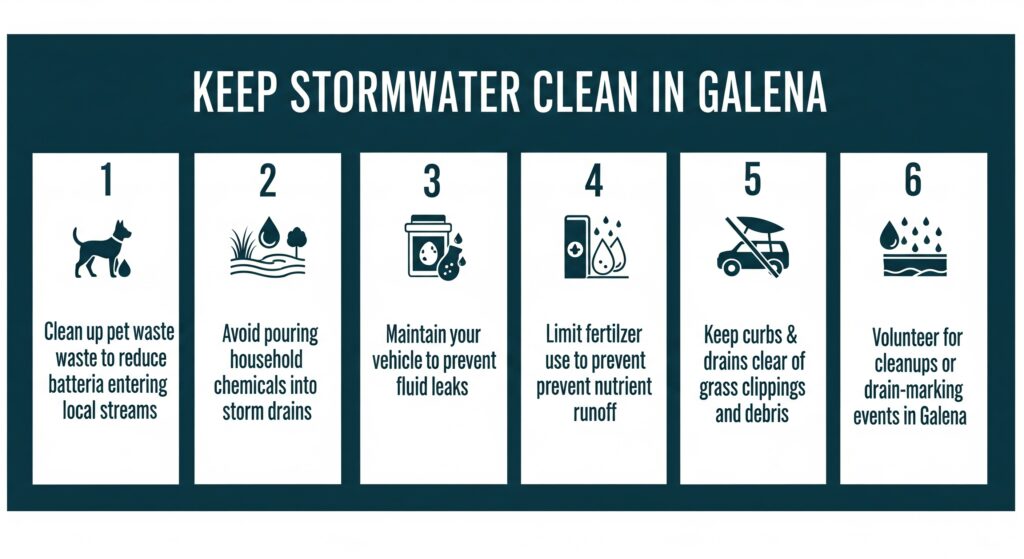Ordinance updating the Village of Galena’s stormwater regulations as part of its MS4 permit.

Want to help reduce salt pollution? Shovel, Scatter, Sweep.
Shovel: Clear snow from sidewalks and parking lots before it turns to ice. The more snow you remove, the less salt you’ll have to use – and the more effective it will be!
Scatter: If you use salt, scatter it so there’s space (about 3 inches) between the grains. A 12 oz coffee mug of salt is enough to treat an entire 20-foot driveway, 10 sidewalk squares, or two parking spaces.
Sweep: Once the salt has done its job, sweep up the excess so you can reuse it for future storms and prevent it from washing away.
You do not have to feel “the crunch” for salt to do its job.
Salt lowers the freezing temperature of water so snow and ice can be more easily removed. Putting more salt on a surface does not make snow and ice melt faster or eliminate the need for plowing or shoveling.
Beware of package labels.
There is no regulation around road salt packaging. Deicers labeled “ecofriendly” or “pet safe” might still contain chloride. Read the product label closely. If there is sodium chloride, magnesium chloride, calcium chloride, or potassium chloride, it still contains salt!
Chloride pollution is not just a winter problem.
Research finds that road salt can continue to pollute streams in the summer, and that aquatic life may be even more sensitive to salt in warmer weather.
Learn More and get involved at www.SaltWatch.org.

The Village owns and maintains a system of ditches, gutters, inlets, and pipes that are designed to carry stormwater runoff away from streets and buildings. Storm drains located at low points along the sides of streets, take the water into underground pipes that can be several hundred feet long and lead to outlets along streams, creeks, ponds, and lakes.
Unlike sanitary sewer systems, the storm sewer system does not lead to a treatment plant. Storm drains are a completely different system than sanitary sewers.
Stormwater runoff becomes a major problem when it picks up garbage, debris, sediment, chemicals, automotive fluids, fertilizers, leaves, and other pollutants from parking lots, yards, village streets, house roofs, etc. This type of pollution is called non-point source (NPS) pollution because it is not from anyone specific source.

It drains toward Little Walnut and Big Walnut Creeks and ultimately Hoover Reservoir, which is the daily water supply for some 500,000 people. Aside from the human health impacts, the cost to each citizen for drinking water purification increases as water quality decreases.
Aside from the practical aspect of people wanting to keep these areas attractive places to be around, dirty stormwater runoff can harm fish and other wildlife living in and around the creeks and lakes
Village of Galena is required by state and federal laws to actively do its part to reduce stormwater pollution in order to protect and improve waterways. The penalties for non-compliance would be costly.


The Village has developed a stormwater code that sets the standards for stormwater management and to maintain uniformity in the design standards for land development projects. Such projects undergo engineering and technical compliance reviews throughout the project development process, from design through construction. These plans and designs are scrutinized by the Planning and Zoning Commission during the application process.

To report an illegal discharge, call the Galena village hall at (740) 965-2484, or use the online reporting form.
Storm drains are designed to handle stormwater runoff only and do not provide treatment to water or other substances that enter the system. The Village of Galena is responsible for managing its storm drain system within the municipality. Public education and participation in reporting sightings or evidence of suspicious substances being dumped down storm drains or directly into our local creeks is an important part in preventing water pollution. Odors, unnatural colors or dead fish are signs that something harmful has entered the water.
As part of our Illicit Discharge Detection and Elimination (IDDE) program, citizens who suspect that they have witnessed illegal dumping into a storm drain or water pollution should report it to the Village offices either by phone or email. If you are not sure whether an illegal discharge has occurred, please report it and we will determine whether any further enforcement action is required.
Proper disposal of common household chemicals and products is important to prevent pollution of our local waterways. Under no circumstances should any of the following (or other chemicals) be disposed of by pouring or placing in a storm drain or directly into a local waterway:
“Gray water,” such as laundry, shower, or kitchen waste water.
Paints, solvents, cleaning products and other toxic household substances.
Gasoline, motor oil, brake fluid, engine coolant (antifreeze) and other toxic automotive products.
Septic tank pump-out and other types of human or animal waste.
Fertilizers, pesticides, herbicides and other agricultural products.
Leaves, grass clippings or yard waste of any kind.
An unnatural color in the water, such as red, white or brown.
An oil sheen floating on the water.
Floatables such as toilet paper, or suds.
A foul or unnatural odor.
Dead fish or other aquatic life.
The storm drainage system helps prevent roads and land from being innundated by diverting rainwater into nearby waterways. During rainstorms, water runs off of buildings, roads, and other hard surfaces, picking up trash, impurities and pollutants along the way. The water and pollutants flow into storm drains and through underground pipes directly into the nearest stream, pond or water reservoir.
The drains in your house are part of a different system, the wastewater system. Dirty water from inside your home flows into underground pipes that are connected to the Village’s wastewater treatment plant. The water from your home is cleaned before it is released into Big Walnut Creek.
Ohio EPA’s website about the MS4 Program.
The Delaware-Knox-Marion-Morrow Solid Waste District (DKMM) conducts events throughout the year for disposing of materials that should not be thrown away in the regular weekly trash. These include materials like old paint, insecticides, herbicides, pesticides, and electronics such as televisions and computers. Check the DKKM website for dates and locations of these collection events and for the list of acceptable materials, or call DKKM at 740-368-1700.
Most retailers that sell motor oil, including NAPA, Advance Auto, AutoZone, O’Reilly Auto and Walmart Tire & Lube Express, will accept motor oil for recycling. Many automotive repair shops will also accept oil, provided it is clean. Used motor oil can’t be recycled if it’s mixed with other liquids like antifreeze or brake fluid. Keep your used motor oil in a clean, leakproof container like a plastic jug or bottle, and make sure the container is clearly labeled identifying the contents.
The Delaware-Knox-Marion-Morrow Solid Waste District (DKMM) conducts events throughout the year for disposing materials that should not be thrown away in the regular weekly trash. These include materials like old paint, insecticides, herbicides, pesticides, electronics such as televisions and computers. Check the DKKM website for dates and locations of these collection events and for the list of acceptable materials, or call DKKM at 740-368-1700.call DKKM at 740-368-1700.
Electronics contain heavy metals which can contaminate drinking water if not handled properly. Electronics should be dismantled by a professional to be recycled into new electronic equipment. They should not be thrown into the regular trash.
The Delaware-Knox-Marion-Morrow Solid Waste District website contains a list of facilities that accept electronics. Or, call DKKM at 740-368-1700.
Also, Best Buy has been accepting electronics, appliances and fitness equipment through their Best Buy recycling program.
The wrong things to do are letting them sit on your property, dumping them along a road, or putting them in someone’s dumpster. The best way is to take them to a business that sells and installs tires, or at a licensed disposal facility, where they will likely charge a disposal fee to cover their costs. Disposal of tires is regulated by the Ohio EPA. For further information, see Ohio EPA’s Scrap Tire Cleanup Program.
If you observe or suspect some sort of pollution has occurred – even if you’re not sure – should be reported to the Galena village administrative office. You may call 740-965-2484 or use the convenient online reporting form. Pollution can be any type of trash or harmful chemicals that are dangerous to people and the environment such as: